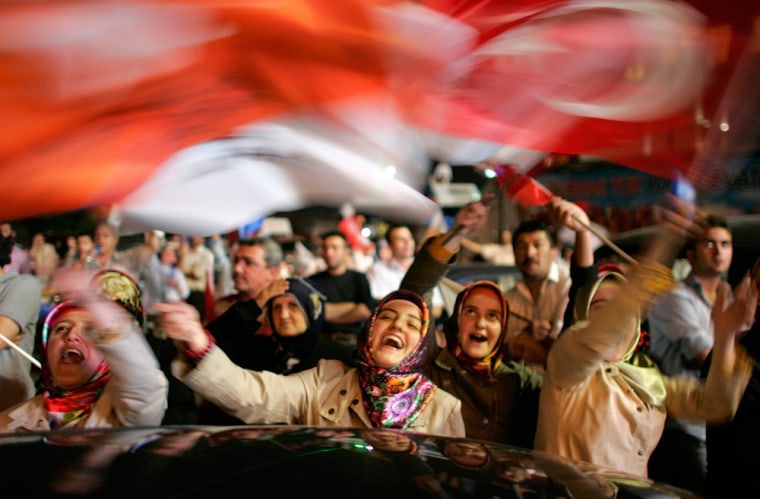Turkey’s prime minister pledged to work toward national unity and fight terrorism after the Islamic-rooted ruling party won parliamentary elections by a wide margin.
Although the ruling party’s success has been touted as proof that Islam and democracy can coexist, the new government is likely to face persistent tension over the role of Islam in society.
State-run Anatolia news agency was projecting that Prime Minister Recep Tayyip Erdogan’s Justice and Development Party would win 340 of the 550 seats, as votes in all but six of more than 158,000 ballot boxes across the country were counted.
Erdogan, a devout Muslim, pledged to safeguard the country’s secular traditions and do whatever the government deems necessary to fight separatist Kurdish rebels.
“We will never make concessions over the values of people, the basic principles of our republic. This is our promise. We will embrace Turkey as a whole without discriminating,” he said at a rally in the capital, Ankara.
EU leader hails Erdogan's win
European Commission President Jose Manuel Barroso congratulated Erdogan’s victory.
“This comes at an important moment for the people of Turkey as the country moves forward with political and economic reforms,” Barroso said in a statement.
The EU chief said that Erdogan “has given his personal commitment to the sustained movement towards” the EU.
The 27-nation bloc, while divided over whether Turkey should one day join the club, continues to spur Ankara to continue reforms to keep on track its membership bid.
Ruling party supporters clapped, danced and waved flags depicting the party symbol, a light bulb, outside the party’s office in Istanbul. In Ankara, hundreds whooped as they watched election results on a big TV screen set up outside party headquarters.
“We are very happy,” university student Reyhan Aksoy said. “God willing, great days await us.”
The election was called early to defuse a showdown with the military-backed, secular establishment, which contended that Erdogan and his allies were plotting to scrap Turkey’s secular traditions despite their openness to the West.
Erdogan raised concern with his efforts as prime minister to make adultery a crime and appoint former Islamists to key positions. Critics also were troubled by his calls for the lifting of restrictions on the wearing of Islamic headscarves.
Kurdish problem
The government will have to decide how to deal with violence by Kurdish rebels seeking autonomy. NATO member Turkey is considering whether to stage an offensive into northern Iraq against separatist Kurdish rebels who rest, train and resupply at bases there.
Erdogan has warned the incursion could happen if security talks with Iraq and the U.S. fail. He has invited Iraqi Prime Minister Nouri al-Maliki to visit Turkey.
“In our struggle against separatist terrorists, we are determined to take every step at the right time,” Erdogan said of the conflict with the Kurds.
The commander of Iraq-based Kurdish rebels told The Associated Press in an interview that he believes Turkey will quickly follow the elections with a long-anticipated offensive against his remote mountain bases.
Murat Karayilan, the leader of the separatist Kurdistan Workers’ Party, or PKK, warned that his fighters were prepared for battle, but denied Ankara’s charges that his group was using Iraqi soil to launch attacks against Turkish forces across the border. He was speaking on Friday.
Turkey has made big strides after the economic and political chaos of past decades, but some feared the vote could deepen divisions in the mostly Muslim nation of 70 million.
Western-style reform
The country has an emboldened class of devout Muslims, led by a ruling party willing to pursue Western-style reforms to strengthen the economy and join the European Union. Under Erdogan inflation has dropped, foreign investment has increased, and the economy has grown at an annual average of 7 percent.
The success of the ruling party signaled continuity in economic reforms and in Turkey’s troubled efforts to join the European Union.
“We will press ahead with reforms and the economic development that we have been following so far,” Erdogan said in his victory speech.
One of Parliament’s first jobs will be to elect a president. The post is largely ceremonial, but the incumbent has the power to veto legislative bills and government appointments.
In May, Foreign Minister Abdullah Gul abandoned his presidential bid after opponents said Gul’s election would remove the last obstacle to an Islamic takeover of government and the military — instigator of past coups — threatened to intervene to safeguard secularism.
Though the ruling party emerged from the vote with a smaller majority than in 2002 elections, its officials expressed surprise with how well they did given the current atmosphere of tension with the secularists.
Two secular parties, the Republican People’s Party and the Nationalist Action Party, won 112 seats and 71 seats, respectively, Anatolia said.
Politicians backed by a Kurdish party that seeks more rights for the ethnic minority returned to Turkey’s Parliament for the first time in more than a decade. The Democratic Society Party, or DTP, won 24 seats in the 550-seat Parliament, according to CNN-Turk television.
The party’s candidates ran as independents to circumvent a 10 percent vote threshold required to win representation in Parliament. The Kurdish politicians were expected to regroup under the party banner when the new Parliament convenes.
According to project results, 50 female lawmakers are expected to enter the Parliament, bringing the share of woman lawmakers in the Parliament to an all-time high of almost 10 percent, the Milliyet newspaper said.
Fourteen parties and 700 independent candidates competed for a total of 42.5 million eligible voters. Voting is compulsory in Turkey, though fines for failing to vote are rarely imposed, and 2002 election turnout was 79 percent.
Turnout was more than 80 percent, and voting was largely peaceful, election officials said.
